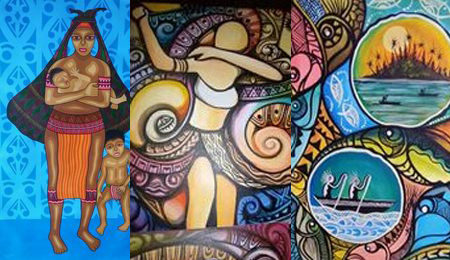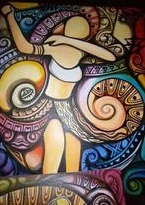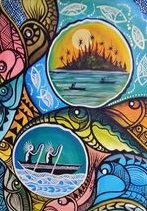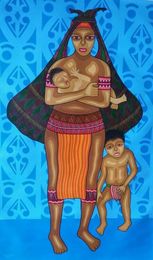Artfully Sustaining the Sea


How can art, in all its forms, communicate inherent bonds with the sea that are often overlooked in conventional approaches to marine science and governance? What are the intersections between creative economies, sustainable development and the ocean? These questions are of central concern to One Ocean Hub as we seek to ensure equitable and inclusive ocean stewardship whereby people and planet flourish. This year, 2021, marks the United Nation’s International Year of the Creative Economy for Sustainable Development, giving strengthened credence to the pressing need to safeguard and promote cultural knowledge and practice. To date, international development agendas have focused upon social, economic and environmental metrics to determine progress and growth. The valuable contribution of art, culture and creative industries, however, is largely discounted in dialogue concerning sustainability and wellbeing.
Recognising the role of art in contributing to the UN Sustainable Development Goals, One Ocean Hub has initiated the ‘Deep Emotional Engagement Programme (DEEP) Fund’ to promote creative practices that share emotional connections with the sea. A vehicle to elevate marginalised voices in global debates about ocean guardianship and conservation, the DEEP Fund gives rise to the views of groups that are often underrepresented in decision-making processes. In a departure from comparable modes of funding that frequently require arts-based research be linked to academic, museological or government partners, the DEEP Fund directly supports individuals, groups and civil society organisations with the aim of eliminating institutional operating costs, boosting livelihoods and encouraging artistic autonomy.
The first round of the DEEP Fund attracted more than 130 applications, of which six selected projects adopt a range of media to reveal emotionally embedded relationships with the ocean.
In South Africa, Fishers’ Tales is a storytelling project jointly led by the Urban Futures Centre and the South Durban Community Environmental Alliance. The project focuses on the experiences of fishers’ based in the coastal province of KwaZulu-Natal, many of whom are of Indian descent and often feel excluded from policy processes. The stories of 15 fisher-folk are recorded in audio-visual format to highlight emotional connections with the sea, build solidarity and advocate for the implementation of inclusive small-scale, subsistence and recreational fishing policies. Each story, captured in English and isiZulu, is accompanied by unique work of art created by young black artists working in media such as drawing, painting, animation and film.
The Sea and Tsitsikamma explores the historical and cultural centrality of the ocean to the people of Tsitsikamma, a diverse set of communities situated within the marine and terrestrial protected Garden Route National Park located on South Africa’s southern coast. Led by Dr Joana Bezerra (Epistemic Justice and Engaged Research Group, Rhodes University), the project exposes intergenerational bonds, knowledge and values attached to the sea. Digital storytelling reveals personal narratives, cultural heritage mapping with 11 villages shares communal meanings of place and plays by three secondary schools examine the experiences of youth who are often omitted from dialogue and debates regarding ocean policy and governance.
The Keiskamma Art Project, located in the heart of Xhosaland in the Eastern Cape, are undertaking Our Sacred Ocean to celebrate spiritual connections between the Xhosa people and the sea. The creation of a monumental embroidery that embodies local memories, prayers and rituals communicates the urgent need for inclusive ocean stewardship to protect and preserve the health of the ocean. Combining intergenerational knowledge, the project makes visible the cultural centrality of the sea to multiple age groups and advocates for recognition of powerful intangible relationships that are central to human and environmental wellbeing and prosperity.
In the Pacific, Netai en Namou Toc [Stories of Mother Ocean] draws upon the cultural and artistic heritage of Erromango, a southern island of the Vanuatu archipelago. The project records, preserves and promotes indigenous knowledge of the ocean, capturing custom stories, practices and resource management. Children’s books, produced in three languages (Sye, Bislama and English), are illustrated by local youth to engage school-aged children and communicate for posterity the significance of relationships with the sea. These publications are shared with chiefly leaders to support coastal governance policies and inform stewardship dialogue with government and the private sector.
The intercountry project Our Ocean, Our Identity is led by three artists: Lloyd Newton in Solomon Islands, Pax Jakupa in Papua New Guinea and Alvaro Sumaki Kuautonga in Vanuatu. Exploring the shared historical, cultural and functional significance of the sea to women of the Western Pacific, multitude relationships with the ocean are translated into co-designed public murals. The paintings, co-produced by youth engaged in art skills training, showcase gendered conceptions of the sea, strengthen regional resolve to actively protect the ocean and bolster community participation in strategies of governance and stewardship.

© Lloyd Newton

© Alvaro Sumaki Kuautonga

© Pax Jakupa
In Ghana, song provides a means of contextualising relationships between fishers’ and the ocean. Cocooned in Harmony, led by Dr Eric Otchere (Department of Music and Dance, University of Cape Coast), examines the act of singing to reveal issues of fisher-folk identity, power, inequality, gender and connectedness to the sea. Often poetically cryptic and containing metaphors, proverbs and anthropomorphisms, the songs and their meanings are shared in a documentary film that focuses on fishing communities from the four main coastal regions of the country: Volta, Greater Accra, Central and Western regions from east to west respectively.
As these projects progress, One Ocean Hub will provide regular updates via our website, newsletter and social media channels on Facebook, Twitter and Instagram. We warmly invite you to follow us as we bring together researchers, artists and coastal communities in order to collaboratively highlight human relationships with the sea, challenge dominant development narratives and advocate for the role of creative economies in presenting resilient solutions to multiple, cross-cutting issues facing the world today. In the coming weeks we will also invite applications to the second round of the DEEP Fund and very much look forward to receiving proposals for projects based in Fiji, Solomon Islands, Namibia and Ghana.
Dr Lisa McDonald is a Post-Doctoral Research Associate with One Ocean Hub, based at the School of Simulation and Visualisation, Glasgow School of Art. Her research explores the interrelatedness of art, culture, heritage and the ocean, with particular focus on the South Pacific.